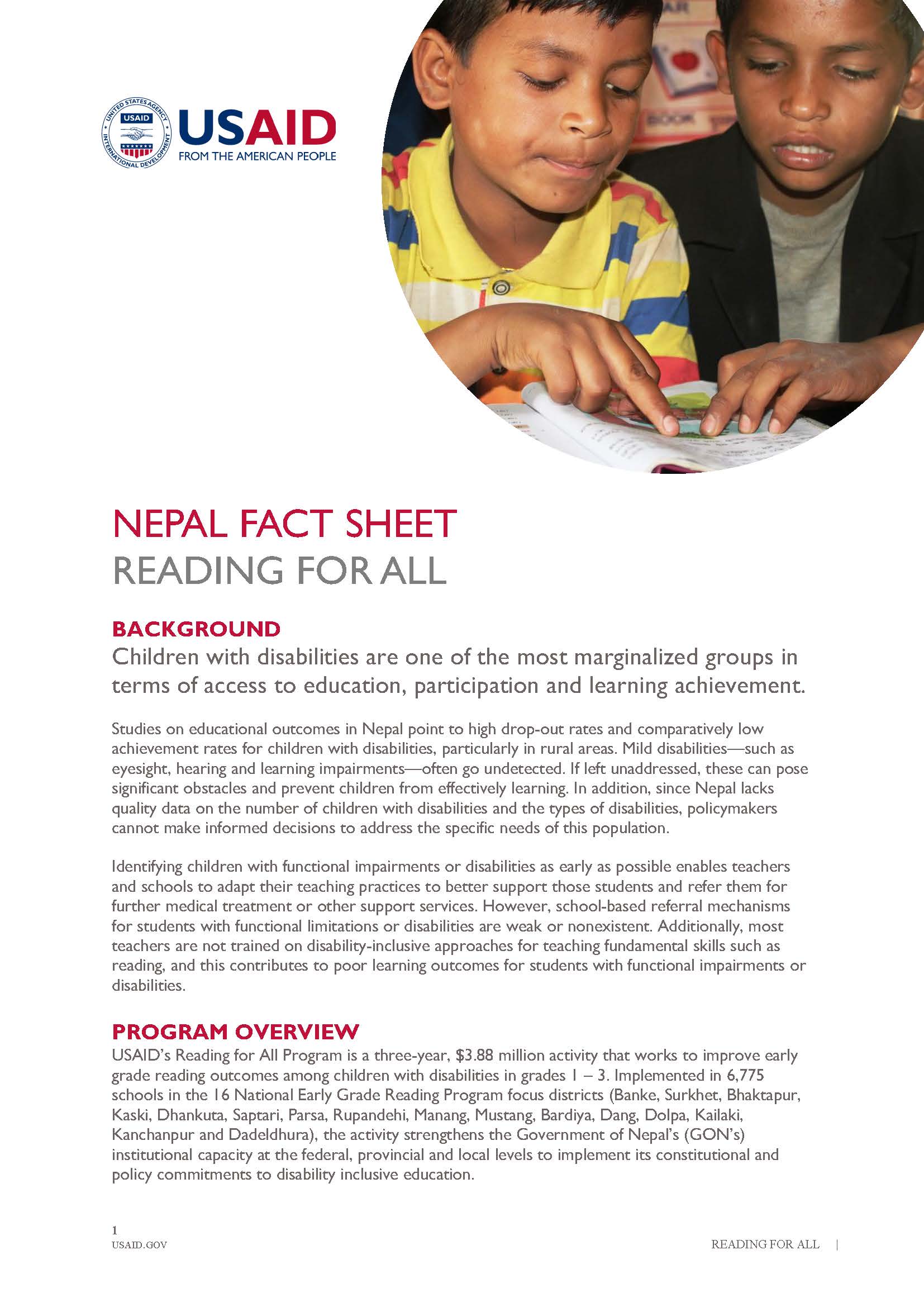Speeches Shim
Background
READING FOR ALL ![]() (pdf - 283k)
(pdf - 283k)
Children with disabilities are one of the most marginalized groups in terms of access to education, participation and learning achievement.
Studies on educational outcomes in Nepal point to high drop-out rates and comparatively low achievement rates for children with disabilities, particularly in rural areas. Mild disabilities—such as eyesight, hearing and learning impairments—often go undetected. If left unaddressed, these can pose significant obstacles and prevent children from effectively learning. In addition, since Nepal lacks quality data on the number of children with disabilities and the types of disabilities, policymakers cannot make informed decisions to address the specific needs of this population.
Identifying children with functional impairments or disabilities as early as possible enables teachers and schools to adapt their teaching practices to better support those students and refer them for further medical treatment or other support services. However, school-based referral mechanisms for students with functional limitations or disabilities are weak or nonexistent. Additionally, most teachers are not trained on disability-inclusive approaches for teaching fundamental skills such as reading, and this contributes to poor learning outcomes for students with functional impairments or disabilities.
Program Overview
USAID’s Reading for All Program is a three-year, $3.88 million activity that works to improve early grade reading outcomes among children with disabilities in grades 1 – 3. Implemented in 6,775 schools in the 16 National Early Grade Reading Program focus districts (Banke, Surkhet, Bhaktapur, Kaski, Dhankuta, Saptari, Parsa, Rupandehi, Manang, Mustang, Bardiya, Dang, Dolpa, Kailaki, Kanchanpur and Dadeldhura), the activity strengthens the Government of Nepal’s (GON’s) institutional capacity at the federal, provincial and local levels to implement its constitutional and policy commitments to disability inclusive education.
Program Objectives
USAID partners with Humanity and Inclusion, World Education, the Nepal Association for the Welfare of the Blind, the National Federation of the Deaf Nepal, and the Disabled Empowerment and Communication Center to implement Reading for All in Nepal to:
- improve data quality on children with disabilities
- Review, revise and integrate the use of early detection tools into the National Early Grade Reading Program;
- Strengthen the integrated education management information system to improve the quality of data on children with disabilities;
- Establish an education response system to streamline early detection for students with functional limitations or disabilities, provide necessary referrals and identify appropriate individualized teaching-learning support in the classroom; and
- Pilot mobile education teams for early identification and referral services.
- enhance institutional and technical capacity to deliver quality reading instruction and support to children with disabilities
- Support the GON’s master plan for inclusive education (2018-2030); and
- Help the GON revise its teacher training modules to include support for children with disabilities in early grade reading; develop early grade reading, teaching and learning materials for children with disabilities; and adapt reading assessments to allow equal opportunities for children with disabilities to demonstrate their readings skills and allow teachers to effectively measure progress.
- pilot test inclusive reading instruction models that can be scaled up for specific groups of children with disabilities
- Test three instructional models for children with disabilities in mainstream schools and schools with resource classes for children with vision, hearing or cognitive impairments.
EXPECTED OUTCOMES
USAID’s Reading for All Program expects to:
- Provide data on effective, low-cost instructional reading models for children with disabilities that can be expanded by the Ministry of Education, Science and Technology and local governments;
- Screen 562,000 children from pre-primary to grade 3 with an early detection tool;
- Train 720 primary school educators to effectively teach students with disabilities; and Train 400 GON education officials on disability inclusive education.


Comment
Make a general inquiry or suggest an improvement.